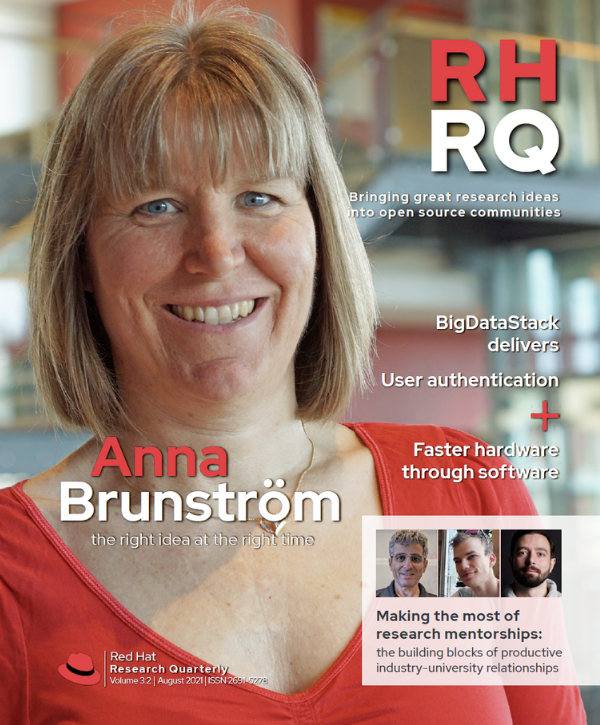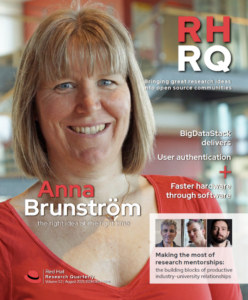Each quarter, Red Hat Research Quarterly highlights new and ongoing research collaborations from around the world. This quarter we highlight collaborative projects in Israel, at Ariel University, Technion University, and The Interdisciplinary Center Herzliya. Contact academic@redhat.com for more information on any project described here.
PROJECT: OpenCEP: An Advanced Open Source Complex Event Processing Engine
Academic investigator: Prof. Assaf Schuster (Technion)
Red Hat investigator: Ilya Kolchinsky
In Red Hat Research Quarterly 2:1, investigators described their plan to build a scalable, real-time, cloud-based CEP engine capable of efficiently detecting arbitrarily complex patterns in high-volume data streams. The engine was designed to be implemented on top of the RedHat® OpenShift® Container Platform and to be applicable to any domain where event-based streaming data is present. Researchers aim to advance the state of the art in the area of complex event processing and to combine academic research with the implementation and deployment of novel CEP mechanisms and techniques.
OpenCEP has reached its fourth and last development iteration. The official release is currently scheduled for August 1, 2021. In addition to the essential features of a CEP engine, this release will introduce a variety of advanced features, including multi-pattern support, nested operators, execution over uncertain data, adaptive optimization of the pattern-matching process, and a versatile parallel execution model.
PROJECT: PHYSICS: oPtimized HYbrid Space-time servIce Continuum in faaS
Red Hat investigators: Luis Tomás Bolívar and Josh Salomon
The goal of PHYSICS is to unlock the potential of the Function-as-a-Service (FaaS) paradigm for cloud service providers and application developers. Specifically, it will enable application developers to design, implement, and deploy advanced FaaS applications in the scope of advanced cloud application design environments, leveraging proven design patterns and existing libraries of cloud/FaaS components. PHYSICS will offer a novel Global Continuum Layer that will undertake to deploy functions in ways that will optimize multiple application objectives at the same time, such as performance, latency, and cost. PHYSICS will validate the benefits of its Global Continuum Layer and tools in the scope of user-driven application scenarios in three important sectors: healthcare, agriculture, and industry. Visit physics-faas.eu/ for more information.
The PHYSICS project started in January 2021, with funding from fourteen international partners, and will end in December 2023. It is currently in the phase of defining the architecture and components, as well as the interactions/APIs between them. Researchers are also gathering the use case requirements to better decide on the architecture and the current state-of-the-art offerings and missing functionality that the PHYSICS project will try to address.

This project has received funding from the European Union’s Horizon 2020 research and innovation programme under grant agreement No 101017047.
PROJECT: Kubernetes Optimized Service Discovery Across Clusters
Academic investigators: Prof. Anat Bremler-Barr and Daniel Bachar (The Interdisciplinary Center Herzliya)
Red Hat investigator: Mike Kolesnik
This research project aims to provide better and more balanced service discovery capabilities for Kubernetes multi-cluster deployments. Currently, the service discovery in this space is very basic. The project aims to investigate and assess different approaches aimed at improving it by making it more balanced, reducing bottlenecks, and improving latency.
The project is now at the design phase in which the different approaches are investigated and discussed, and the API to support them is being formalized. Visit submariner.io for more information.
PROJECT: Ceph: Wire-Level Compression-Efficient Object Storage Daemon Communication for the Cloud
Academic investigators: Prof. Anat Bremler-Barr and Maya Gilad (The Interdisciplinary Center Herzliya)
Red Hat investigator: Josh Salomon
This project’s purpose is to reduce storage network traffic (object, block, etc.) for the following cases: between the failure domains in cost-sensitive environments such as public clouds, and between nodes in cases where the network bandwidth is the bottleneck of the node performance.
The project coding ended several months ago. As happens often in a large open source project, merging the pull request into the main branch is a challenge in itself. After several iterations of rebase/automated testing, which found a bug in the code due to a rare race condition, researchers believe they are in the final stages of the merge. While the process is long—each automated test cycle takes days to complete—it was useful.
PROJECT: Secured API in Hybrid Cloud
Academic investigator: Dr. Amit Dvir (Ariel)
Red Hat investigator: Anna Sandler, mentored by Luiza Nacshon
Researchers will be exploring different types and parts of hybrid cloud APIs and studying the differences between handwritten self-managed APIs and APIs that are managed by API management tools. The goal is to study the base rules of securing a channel-level API in a hybrid cloud and the importance of each component. Using API management tools, we can track data flow in and out of our clouds. By choosing the right rules for a given hybrid cloud—based on data sensitivity, workloads, and user access—data loss, data leak, and other cyber challenges can be prevented.
We are working on improving the API management tool for OpenShift and optimizing its security rules by creating a Rapid PT tool that users can execute to test API security. The tool will demonstrate several possible attacks: DoS, SQL and XSS injections, authentication abuse, and man-in-the-middle (MITM) attacks. Users will get a report from the tests with tips on how to improve their API security.



















